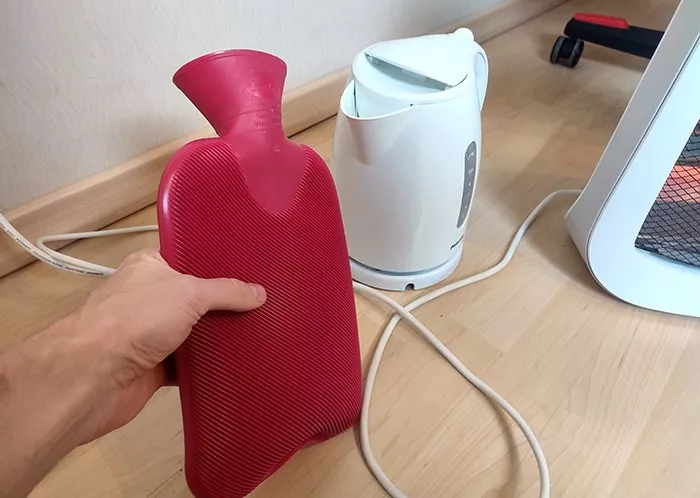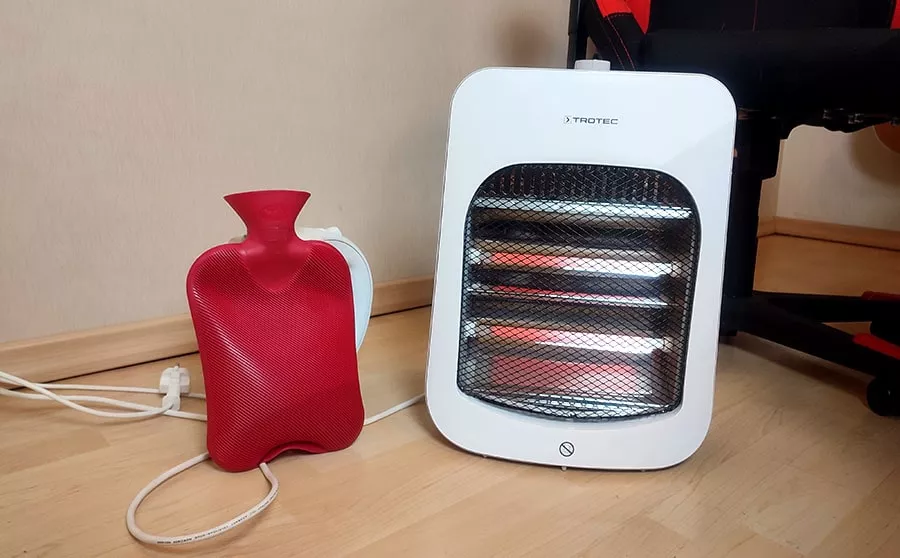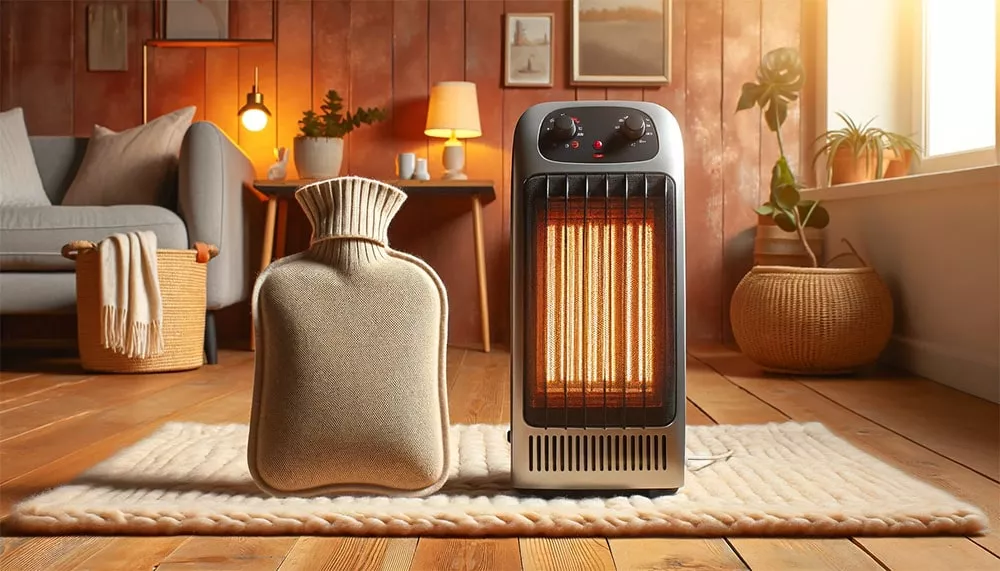I’ve been writing articles for this website for over 4 years now, spending hours and hours explaining space heaters and how to use them effectively.
All the while resting both feet against a hot water bottle lying on the floor, under my desk.
And one thought just popped up in my mind: Am I a hypocrite?
I’ve spent so much time & effort writing about heaters and telling people which products to buy. All this, of course, earns me some money as well, when people buy from my recommendations.
But, I, myself, actually don’t use space heaters that much.
I find myself using hot water bottles for a majority of my working time. And if I tell my readers about one thing while using the other, there might be some interesting knowledge to be gained.
In this article, we will break down the key differences between hot water bottles and electric space heaters.
For many people, space heaters will be a total waste of money, while hot water bottles will be true money savers.
So, let’s have a look.
Quick Pick: Go for a 2L Hot Water Bottle
For those considering a hot water bottle, I highly recommend a 2L size.
My recommendation is this 2L hot water bottle I found on amazon.
It’s the sweet spot for warmth - retaining heat longer than the smaller 1L bottles and reducing the frequency of boiling water.
The 2L size offers a perfect balance of lasting warmth and convenience. While brands may vary, the key is in the size and durability.
So, choose any well-made 2L bottle for a comfortable, cozy experience.
 Here’s my 2L hot water bottle. Love it!
Here’s my 2L hot water bottle. Love it!
Space Heater vs Hot Water Bottle: What are the differences?
1. Total Expenses: A Cost Comparison
Space Heater Costs - More Than Just the Price Tag
- Quick Summary: Running a space heater isn’t cheap. For 8 hours a day, it’ll cost you about $61.20 a month. That’s like adding a couple of fancy meals to your monthly expenses!
- Behind the Numbers: This figure comes from a typical 1,500-watt heater used daily. It’s the small daily costs that add up, reflecting in your electricity bill.
Hot Water Bottle Costs - Pocket Change!
- Economical Choice: Using a hot water bottle every day? Your monthly cost is a mere $1.53. That’s less than a cup of coffee!
- Calculation Simplified: Boiling water four times a day with a standard kettle is incredibly cost-effective. It’s warmth at the price of pennies.
The Bottom Line
- Stark Contrast: There’s a big difference between the two. A space heater, while convenient, can be a significant addition to your monthly expenses. The hot water bottle, on the other hand, is a symbol of efficiency and economy.
2. Health and Wellness: Comfort Beyond Warmth
As a heating expert, I’ve learned that choosing between a space heater and a hot water bottle isn’t just about warmth—it’s about your overall well-being.
Space Heaters: Watch the Air Quality
- Dry Heat: Space heaters can dry out the air, potentially irritating your skin and respiratory system.
- Quick Tip: Pair your space heater with a humidifier or a bowl of water to keep the air comfortable.
Hot Water Bottles: Gentle and Therapeutic
- Moist Heat: They offer a more skin-friendly warmth, without drying out the air, and can relieve muscle aches and stress.
- Perfect For: Those with sensitive skin or who need localized pain relief.
Your Health, Your Choice
- Balance is Key: Consider your health needs when choosing. If you have respiratory issues or dry skin, a hot water bottle might suit you better.
- Listen to Your Body: Pay attention to how you feel with each heat source and adjust accordingly.
In short, think about how each option affects not just your temperature, but also your comfort and health. Your ideal choice should make you feel warm and well.
3. Feeling of Warmth / Heating Efficiency
The distinction in the feeling of warmth and heating efficiency between a space heater and a hot water bottle lies in their modes of heat transfer and the directness of their warmth.
Hot Water Bottles: Direct Contact and Efficient Heat Transfer
- Direct Heat Transfer: Hot water bottles provide warmth through direct contact. This method ensures that the heat is transferred efficiently to the body with minimal loss. The heat from the hot water bottle is concentrated, targeting specific areas like feet, hands, or a cold lap.
- No Heat Loss through Air: Unlike space heaters, which heat the surrounding air, hot water bottles transfer heat directly through touch. This means there’s no heat loss by transmission through the air. In an environment where you’re seeking personal warmth rather than heating an entire room, this directness makes hot water bottles highly efficient.
The sensation of holding or resting against a hot water bottle is one of immediate, enveloping warmth. This is particularly comforting in colder weather or when you need quick relief from the chill. The direct contact ensures that the heat is not dissipated into the surrounding environment but is instead concentrated where it’s most needed.
Space Heaters: Ambient Warmth with Transmission Losses
- Ambient Heating: Space heaters work by warming the air in a room. This form of heating is effective for creating a comfortable ambient temperature in a space but can be less efficient for personal warmth.
- Heat Loss through Air: The process of heating air and circulating it through a room inherently involves heat loss. Warm air tends to rise away from where it might be most needed, and in larger or poorly insulated rooms, a lot of the heat generated by a space heater can be lost.
Space heaters are ideal when the goal is to raise the overall temperature of a room or when multiple people need to be warmed. However, for individual comfort, particularly when seated or stationary for long periods, the heat can feel less concentrated and slower to affect one’s personal sense of warmth.
In fact, I found the best way to improve an electric oil-filled radiator’s efficiency, by directly touching it with your feet (similar to a hot water bottle).

Efficiency in Context
In terms of heating efficiency, a hot water bottle, with its direct and concentrated heat transfer, is superior for personal warmth. It’s especially effective in scenarios where you’re stationary for extended periods, like working at a desk or relaxing on a couch. Space heaters, while excellent for warming an entire room, might not provide the same level of direct warmth and can be less efficient due to heat loss through air transmission.
The choice between the two comes down to the specific heating needs: for personal, targeted warmth, the hot water bottle excels, while for overall room heating, a space heater is more appropriate.
4. Heating Speed
Hot Water Bottle: Quick and Immediate Warmth
- Fast Preparation: One of the most significant advantages of a hot water bottle is the speed at which it can provide warmth. Boiling water and filling the bottle is a matter of minutes. From my experience, you can have a hot water bottle ready in about 5 minutes, offering almost instant comfort.
- Direct Heat: The moment you cuddle up with a hot water bottle, the warmth is noticeable. This immediacy is especially beneficial if you need quick relief from the cold.
Space Heater: Gradual but Consistent
- Initial Warm-Up Time: Space heaters generally take longer to impact the temperature of a room. Depending on the size of the space and the heater’s capacity, it might take anywhere from 15 minutes to an hour to feel a significant difference.
- Sustained Heating: Once a space heater reaches its operating temperature, it maintains a consistent level of warmth in the room. This is ideal for long-term comfort, especially in larger spaces.
6. Logistics / Weight / Preparation Time
Hot Water Bottle: Simplicity and Ease
- Effortless Preparation: Filling a hot water bottle is a straightforward task. The process of boiling water, either in a kettle or on the stove, and then transferring it into the bottle, is simple and requires minimal effort.
- Lightweight and Handy: Hot water bottles are lightweight and easy to handle. They can be tucked into a bed or placed on a lap without any hassle. This ease of handling makes them very user-friendly, especially for elderly individuals or children.
Space Heater: Bulky and Less Flexible
- Setup and Placement: Space heaters require a bit more thought in terms of placement. They need to be situated near an outlet and kept away from flammable materials. In my experience, finding the right spot for a space heater where it’s both effective and safe can sometimes be a challenge.
- Heaviness and Mobility: Many space heaters are bulky and heavy, making them difficult to move. Some models do come with wheels or handles, but they’re still not as portable as a hot water bottle.
7. Safety
Hot Water Bottle: Low-Risk Comfort
- Minimal Safety Concerns: The hot water bottle is an exceptionally safe heat source. The only time it uses the electric grid is during the boiling of water. Once filled and sealed, there’s no further risk of electrical hazards.
- Worst-Case Scenario: The worst thing that can happen with a hot water bottle is a water spill, which, while potentially uncomfortable, poses no significant danger. I often recommend hot water bottles for their safety, especially in homes with children or pets.
Space Heater: Requires Constant Vigilance
- Ongoing Safety Risks: Space heaters, by contrast, are a constant safety threat. They need to be operated with caution, particularly around flammable materials. I’ve seen incidents where curtains or furniture placed too close to a heater have led to dangerous situations.
- Monitoring and Maintenance: Continuous use of space heaters requires regular monitoring and maintenance. They should not be left unattended for long periods, and it’s crucial to ensure they’re functioning correctly to avoid fire hazards or electrical issues.
8. Emergency Heat
Hot Water Bottle: Versatile in Emergencies
- Multiple Heating Methods: In emergency situations, like a power outage, a hot water bottle still proves to be useful. You can heat water on a gas stove or even over a fire. This versatility is a significant advantage, ensuring you can have warmth even when the grid is down.
- Reliable and Accessible: I always emphasize the importance of having a backup heating plan, and hot water bottles fit perfectly into this role. They’re a reliable source of heat in emergencies, requiring only a heat source to warm the water.
Space Heater: Limited Emergency Use
- Dependence on Electricity: Most electric space heaters are useless during power outages. Their reliance on the electric grid makes them impractical as an emergency heat source.
- Propane Heaters as an Alternative: While electric heaters fall short in emergencies, propane heaters can provide ample heat. However, they require the presence and handling of propane, which might not be feasible or safe for everyone.
8. Sustainability
Hot Water Bottle: Long-Lasting and Durable
- Durability: A hot water bottle, with proper care, can last for many years, even decades. Their simplicity contributes to their longevity, with no moving parts or complex mechanisms to break down.
- Eco-Friendly Option: From a sustainability perspective, hot water bottles are an excellent choice. They require minimal resources to produce and maintain, and their long lifespan means less waste.
Space Heater: Varies by Type
- Dependent on Design: The sustainability of space heaters varies widely depending on their design. Oil-filled radiators, for example, tend to have a longer lifespan. However, heaters with moving parts, like fans or blowers, are prone to more frequent breakdowns due to dust accumulation and mechanical wear.
- Considerations for Purchase: When choosing a space heater, I always advise considering the type and its expected lifespan. Opting for models with fewer moving parts can enhance sustainability and reduce the need for replacements.
9. Noise
Hot Water Bottle: Silent Comfort
- No Noise Emission: One of the most significant advantages of a hot water bottle is its silence. It emits no noise, making it ideal for use in quiet environments or during sleep. The absence of any sound adds to the comfort and relaxation it provides.
Space Heater: Sound Levels Vary
- Varied Noise Output: Space heaters, depending on their type and model, can emit varying levels of noise. Some models, especially older ones or those with fans, produce a noticeable hum or buzzing sound.
- Consideration for Quiet Environments: In settings where noise is a concern, such as bedrooms or quiet workspaces, the noise level of a space heater can be a significant drawback. It’s something I always ask clients to consider, especially if they’re sensitive to sound or require a tranquil environment.
Conclusion: Should you Use a Space Heater or a Hot Water Bottle?
After years of working with heating systems and seeing a wide range of needs and preferences, I’ve come to realize that the choice between a space heater and a hot water bottle isn’t just about the device itself, but about understanding your specific circumstances and requirements. Here’s my advice on making the right choice:
Opt for a Space Heater If:
- Unreliable Home Heating System: If your home’s central heating system is not reliable or efficient enough to keep your entire home warm, a space heater can be a valuable addition. It ensures that your living space remains comfortable, even when the main system falls short.
- Family with Kids: Families with children often need a consistently warm environment. Children, especially the younger ones, are more sensitive to cold. A space heater can provide the necessary ambient warmth to keep the entire family comfortable.
- Need for Overall Warmth: If your goal is to raise the temperature of an entire room or house, rather than just warming yourself, a space heater is the way to go. It’s designed to distribute warmth throughout a space, making it ideal for general heating needs.
- Health Concerns: In situations where frequent cold can lead to health issues, such as for elderly family members or those with certain medical conditions, maintaining a warm environment is crucial. A space heater can provide the consistent, controllable heat needed to safeguard health.
Choose a Hot Water Bottle If:
- Base Heat Covered: If your home is generally warm, but you find yourself needing a bit of extra heat, a hot water bottle is an excellent choice. It’s perfect for adding that extra layer of warmth without overheating the entire room.
- Personal Warmth at a Desk: For those of us who spend long hours working at a desk, especially in home offices that might not be as well-heated as the rest of the house, a hot water bottle is a boon. It offers localized warmth, keeping you comfortable and focused.
- Energy Efficiency and Cost Savings: If you’re conscious about energy usage and looking to save on heating costs, a hot water bottle is a more economical and environmentally friendly option. Its direct heat transfer means you’re warming up exactly where and when you need it, without the higher energy costs of running a space heater.
In my personal and professional journey, I’ve seen how the right choice of heating can not only bring physical comfort but also peace of mind. Whether it’s the cozy, targeted warmth of a hot water bottle or the room-filling, ambient heat of a space heater, understanding your needs will guide you to the best choice for your comfort and well-being. Remember, it’s not just about the heat — it’s about how that heat serves your life.
